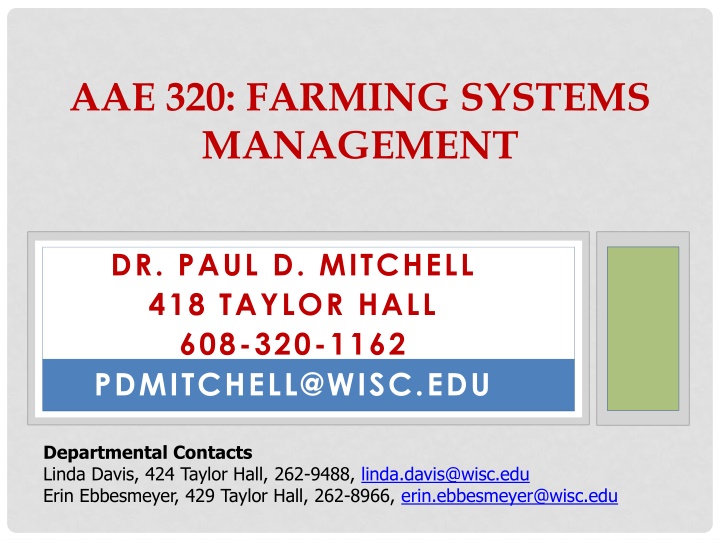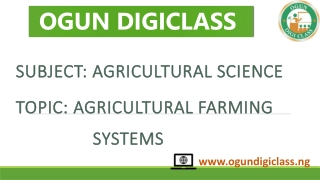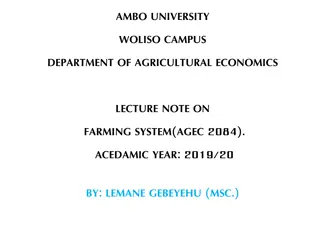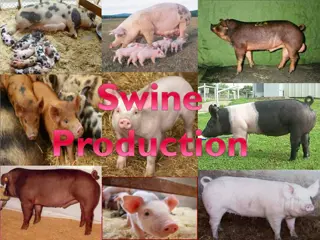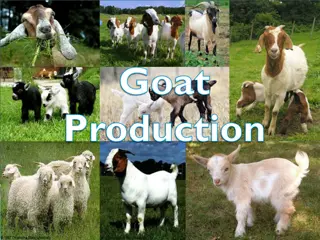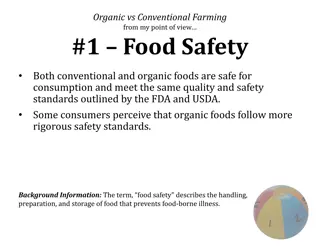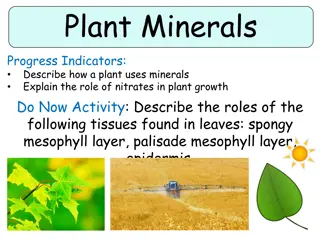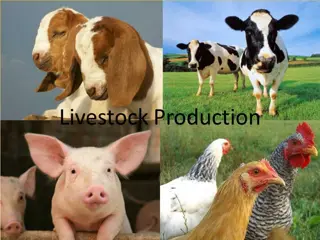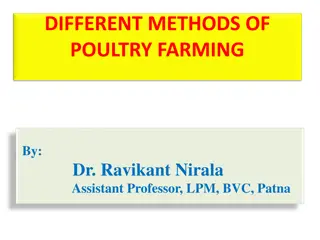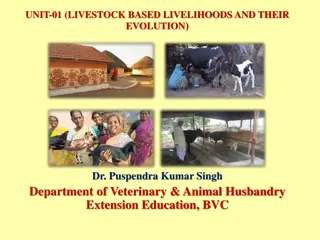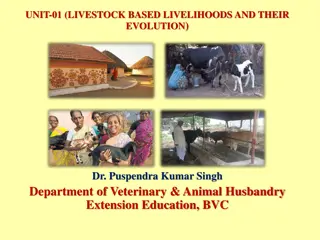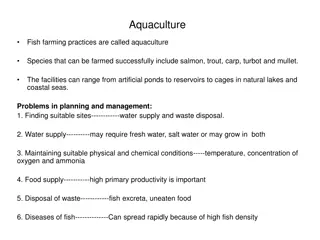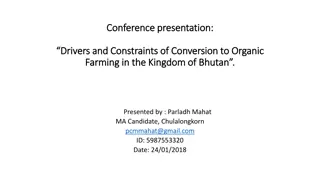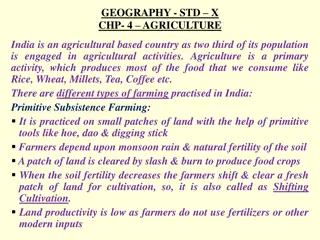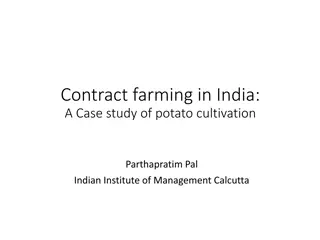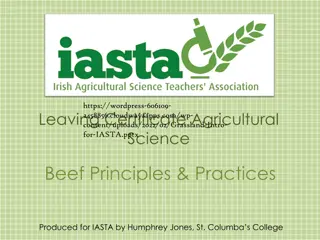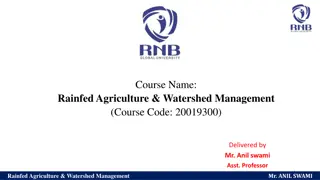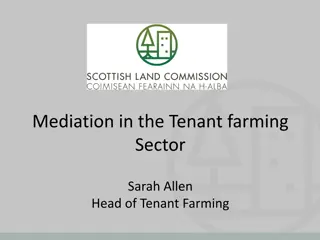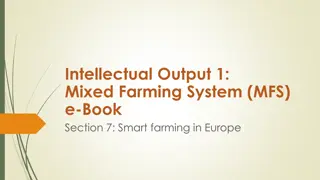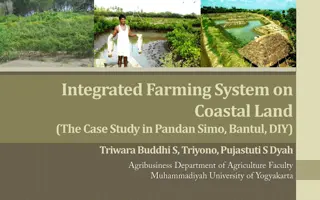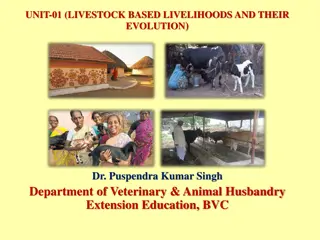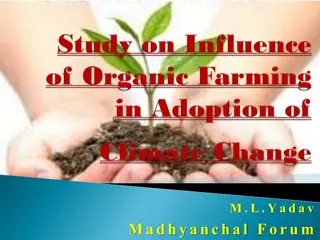Farming Systems Management Course Overview
This course introduces basic economic principles applied to agricultural production systems in the U.S., emphasizing the complexity of agriculture. Topics include problem sets, course objectives, grading criteria, and contact information for Dr. Paul D. Mitchell. Online and face-to-face options are available, and resources are provided on the course homepage. Stay informed about COVID-19 protocols and follow the Badger Pledge for a safe learning environment.
Download Presentation

Please find below an Image/Link to download the presentation.
The content on the website is provided AS IS for your information and personal use only. It may not be sold, licensed, or shared on other websites without obtaining consent from the author.If you encounter any issues during the download, it is possible that the publisher has removed the file from their server.
You are allowed to download the files provided on this website for personal or commercial use, subject to the condition that they are used lawfully. All files are the property of their respective owners.
The content on the website is provided AS IS for your information and personal use only. It may not be sold, licensed, or shared on other websites without obtaining consent from the author.
E N D
Presentation Transcript
AAE 320: FARMING SYSTEMS MANAGEMENT DR. PAUL D. MITCHELL 418 TAYLOR HALL 608-320-1162 PDMITCHELL@WISC.EDU Departmental Contacts Linda Davis, 424 Taylor Hall, 262-9488, linda.davis@wisc.edu Erin Ebbesmeyer, 429 Taylor Hall, 262-8966, erin.ebbesmeyer@wisc.edu
APOCRYPHAL (FAKE) CHINESE SAYINGS Chinese Curse: May you live in interesting times The Chinese word for Crisis is composed of two characters: one for Danger and one for Opportunity Neither of these is true, but both seem to be especially poignant in our current situation
CORONAVIRUS PANDEMIC Read the Badger Pledge: https://smartrestart.wisc.edu/badgerpledge/ Wear face mask, spread out in classroom, don t get together in large groups Monitor yourself for symptoms: https://doso.students.wisc.edu/ Do not come to class or go out if you are ill Get tested when needed: https://www.uhs.wisc.edu/medical/testing/ Let me know if you test positive or need to quarantine AAE 320: online option, classroom will be livestreamed and recorded
COURSE OBJECTIVE For students to understand basic economic principles and their application to the management of agricultural production systems and to gain an appreciation of the complexity of U.S. agriculture. Face-to-Face Classroom Instruction, with potential for online options. If need the on-line option, contact me ASAP.
COURSE HOMEPAGE HTTPS://AAE.WISC.EDU/PDMITCHELL/AAE-320/ I will post many materials on the course homepage, some of which you may want to print. You will have printing costs for assignments & exams You may have costs to scan and/or clearly photograph pages and submit electronically Canvas will be used to collect assignments and to post grades No Textbook: Classic text: Kay, Edwards & Duffy (2019)
GRADING Grades calculated based on the following weights Problem Sets Class Discussion & Participation 20% Mid-Term Exams (2 x 20% each) 40% Cumulative Final Exam Grading Scale 93 88 and < 93 AB 83 and < 88 78 and < 83 BC 70 and < 78 60 and < 70 < 60 20% 20% A B C D F
PROBLEM SETS Several (8 or more) through out the semester Posted on Course Page as pdf Watch lecture videos, do think breaks Come to class to discuss and work problem sets Submit completed problem sets electronically on Canvas as scans or clear photographs Answer key posted on Course Page Grades posted on Canvas
CLASS DISCUSSION & PARTICIPATION Special topics to build student awareness of agricultural issues and context for course topics Video lecture(s) to watch before class Discussion Sheet posted as pdf on Course Page Simple questions to answer (10 points), deeper ones to consider for class Complete and submit via Canvas before class Half credit if competed late (after class) Small group and large group discussion in class or online via Zoom breakout rooms
EXAMS Two Mid-terms exams and a cumulative Final Announced at least 1 week in advance Best Guess: Oct. 9 and Nov. 6 (could change) Based on lectures, materials posted on course page and discussed in class, and problem sets Expect questions to challenge your understanding and use of managerial concepts and tools Previous exams and keys available on the course page to aid your studies Final Exam: Dec. 12 (Saturday), 12:25 PM 2:25 PM
TOPICS COVERED IN AAE 320 Introduction Course Overview Wisconsin Agriculture, The US Food System Production Economics Partial Budgeting Single Input Production Economics Multiple Input Production Economics Cost Economics Special Topics EXAM #1 (Around October 9th)
TOPICS COVERED IN AAE 320 Farm Finance Balance Sheets Depreciation Income Statement Taxes, Business Arrangements and Farm Transfer Overview of Farm Taxes Business Arrangement Alternatives Tax Considerations for Farm Transfer Special Topics EXAM #2 (Around November 6th)
TOPICS COVERED IN AAE 320 U.S. Farm Policy and Programs Commodity Support Programs Crop Insurance Programs Agricultural Sustainability Special Topics FINAL EXAM DEC. 12, 12:25 PM 2:25 PM
LETS TALK ABOUT IT! We will take a break from lecture to examine an agricultural issue in a discussion-oriented class Agriculture, Nutrients and Water Quality Dairy Farming in Wisconsin Beginning Farmers Variety of readings and videos with some questions and writing before class, then in class small and large group discussions Goal: to develop an appreciation for the complexity of US agriculture and to practice assessing evidence
SUMMARY Class Homepage is your textbook, get familiar with it; check it regularly https://aae.wisc.edu/pdmitchell/aae-320/ Expect lots of work: mostly problem sets and long exams, but it s not rocket science Communicate with me if real life intervenes Email is best: pdmitchell@wisc.edu Cell phone: 608-320-1162
STANDARD STUFF Academic Calendar and Religious Observances https://secfac.wisc.edu/academic-calendar/#religious-observances Academic Integrity Statement By virtue of enrollment, each student agrees to uphold the high academic standards of the University of Wisconsin-Madison; academic misconduct is behavior that negatively impacts the integrity of the institution. Cheating, fabrication, plagiarism, unauthorized collaboration, and helping others commit these previously listed acts are examples of misconduct which may result in disciplinary action. Examples of disciplinary action include, but is not limited to, failure on the assignment/course, written reprimand, disciplinary probation, suspension, or expulsion.
MCBURNEY DISABILITY RESOURCE CENTER SYLLABUS STATEMENT The University of Wisconsin-Madison supports the right of all enrolled students to a full and equal educational opportunity. The Americans with Disabilities Act (ADA), Wisconsin State Statute (36.12), and UW- Madison policy (Faculty Document 1071) require that students with disabilities be reasonably accommodated in instruction and campus life. Reasonable accommodations for students with disabilities is a shared faculty and student responsibility. Students are expected to inform me of their need for instructional accommodations by the end of the third week of the semester, or as soon as possible after a disability has been incurred or recognized. I will work either directly with you or in coordination with the McBurney Center to identify and provide reasonable instructional accommodations. Disability information, including instructional accommodations as part of a student's educational record, is confidential and protected under FERPA. See the McBurney Disability Resource Center: https://mcburney.wisc.edu/.
DIVERSITY AND INCLUSION Diversity is a source of strength, creativity, and innovation for UW-Madison. We value the contributions of each person and respect the profound ways their identity, culture, background, experience, status, abilities, and opinion enrich the university community. We commit ourselves to the pursuit of excellence in teaching, research, outreach, and diversity as inextricably linked goals. The University of Wisconsin-Madison fulfills its public mission by creating a welcoming and inclusive community for people from every background people who as students, faculty, and staff serve Wisconsin and the world.
